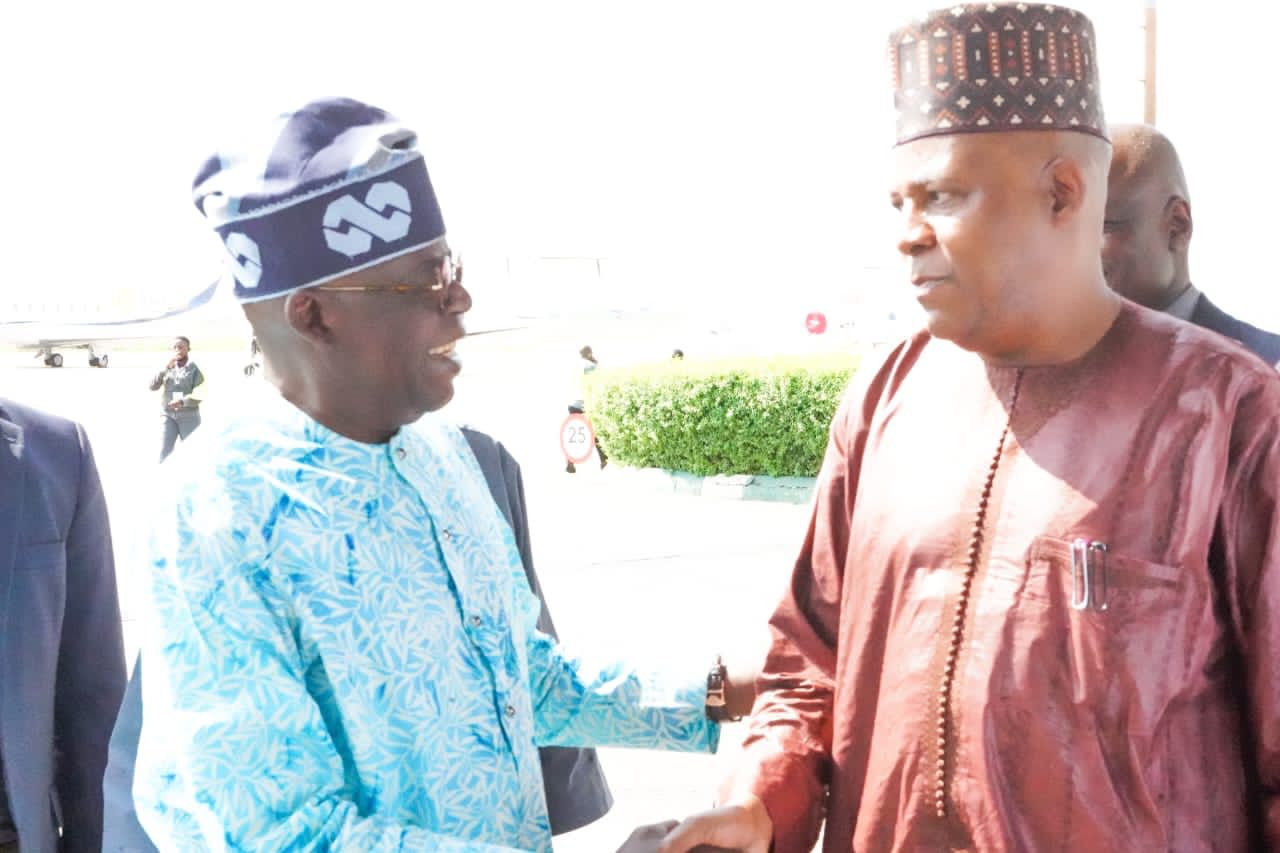Muslim-Muslim Ticket
A Nigerian politician visited Columbia. While there, he met a civil servant who owned several luxury cars and lived in a mansion with several servants. “How can a mere civil servant be so affluent?” asked the Nigerian politician. The Columbian took him to the window and asked, “Do you see that road?” “Yes?” The civil servant […]

Tinubu, Shettima
A Nigerian politician visited Columbia. While there, he met a civil servant who owned several luxury cars and lived in a mansion with several servants.
“How can a mere civil servant be so affluent?” asked the Nigerian politician.
The Columbian took him to the window and asked, “Do you see that road?”
“Yes?”
The civil servant patted his pocket and said: “15%”.
- Column No.6: Food prices, and other Nigerian horror stories
- Insecurity and the food crisis in northern Nigeria
So the politician returned to Nigeria. One year later, the Columbian is in Nigeria. When he noticed that the Nigerian now had a more lavish lifestyle than himself, he had to ask, “how manage?”.
They went to the window. “Do you see that bridge over there?”
“What bridge?”
The Nigerian pats his pocket and says, “100%”.
The Nigerian politician is Muslim, and the Colombian is Christian. Birds of the same feather.
There is an adage that says you should stay away from three things when having public discussions: politics, religion and money.
Honestly, over time, I have whittled it down to just one topic: Politics. Politics is the one topic that should be avoided in conversations, regardless of the individual. While other sensitive subjects may be discussed under certain circumstances, political discourse often leads to negative outcomes. My observation, based on personal interactions, is that political discussions rarely result in positive outcomes. Even among individuals with shared political beliefs, the conversation can become contentious and emotionally draining.
The Obidients, the Bulabas. And so on. Hateful names.
Political victories often lead to feelings of frustration and blame towards opposing viewpoints. Furthermore, political discussions seldom change minds, making the negative consequences largely unnecessary. All it does is lead to heightened levels of anxiety, massive migraines and high blood pressure. Which is why I stick to medicine.
However, these days, the trend is changing. Everywhere I turn in this country, whether on mainstream media or social media- the topic is the same- Politics and the Nigerian economy. Whether at departmental presentations where the topic is hypertension in pregnancy or at zoom meetings discussing qualitative research or the front page of the New York Times, the conversation is always steered towards the state of the Nigerian economy and how we got here.
Well, I have a theory. One of the reasons we are where we are is because, the religious card was shoved down our throat.
When President Bola Ahmed Tinubu decided to run for president on a Muslim-Muslim ticket alongside Vice President Kashim Shettima, it ignited a firestorm of controversy.
In a country like Nigeria, where Muslims and Christians both have considerable demographic and cultural influence, this decision sparked concerns about heightening religious tensions. Critics had previously warned that not choosing a Christian vice-presidential candidate could result in feelings of marginalisation and division.
After taking office, the president prioritised assembling a cabinet with a diverse religious makeup to counter these criticisms. Over the past year, President Tinubu’s administration has taken notable bold steps towards promoting religious harmony through balanced appointments, supportive policies, and interfaith dialogue.
Do the Christians still feel disenfranchised? I can’t answer that.
What I can answer, however, is that religion played a very large role in choosing a leader that has proven to be even more insensitive than PMB.
The President of SCSN, Sheikh AbdurRasheed Hadiyyatullah, in an interview with journalists during a National Conference which held Abuja with the theme, “Matters Arising From 2023 Election and Associated Socio-Economic Challenges” said that despite the enormous support received by the president during the election, Nigerians have not enjoyed dividends of democracy since he came to power. In his words “I don’t want to go personal, but the Sharia Council helped the Muslim-Muslim ticket to be successful. We campaigned and supported this government until it came to power, but we are suffering”.
I laugh in fulfulde!
When we tell people not to campaign based on religion, we are accused of being too ‘elitist’. Too modernist. Too ‘pro-west’.
The argument that Peter Obi did the same as portrayed in his leaked phone call does not mean that we should also do the same. Too wrongs do not make a right.
From the earliest civilisations, man has used religion to aid in ruling his subjects, either in the form of a spokesman or as god himself. In later years religion is more greatly used as a political tool wielded by the church or by Islamic scholars.
When Karl Marx discussed religion as the “opiate of the masses” and the significant role it played in maintaining the status quo, he must have been referring to Africans. His argument that religion keeps the masses docile, by placing the individual in charge of their own salvation and teaching them there is only one way to achieve it, still holds true. To this end, religion has been used as a tool to keep the masses content, by promising rewards in the after-life rather than in this life.
Meaning that in this life, we the masses, are doomed to suffer.
In a way, it is good that we are all collectively feeling the heat of this government. Maybe next time, in 2027, we will elect based on merit and not what a religious scholar dictates to us.
